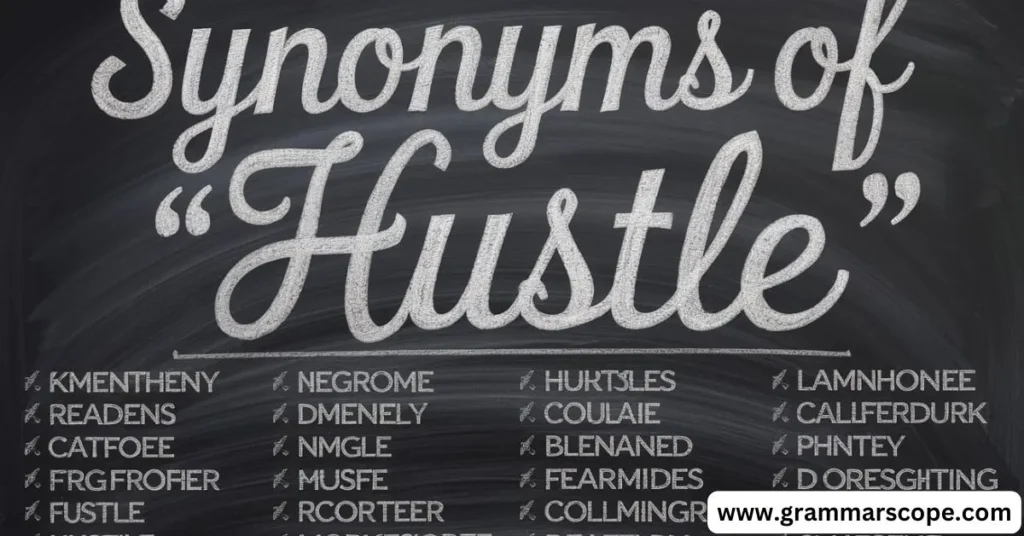Spelling can make or break how people perceive your professionalism. Consider the words “hustle” or “hussle” they sound the same but have distinct implications in written communication. This article clarifies their correct usage, meanings, and origins to keep your writing sharp.
The confusion between “hustle” and “hussle” stems from similar pronunciation. While “hustle” means working hard or moving quickly, “hussle” lacks recognition in standard dictionaries. Misusing these words can affect your message, especially in professional contexts.
Always choose “hustle” for its clear meaning of determination and effort. Avoid “hussle” unless referencing cultural slang or informal settings like social media posts. Spelling counts!
Why Is There Confusion?
The confusion between “hustle” and “hussle” stems from their similar pronunciation. In spoken English, they sound nearly identical, leading people to think both forms might be correct. Additionally, cultural influences such as branding, music, and modern slang have popularized “hussle,” even though it isn’t officially recognized in standard dictionaries.
Adding to the mix, informal writing on social media often disregards spelling norms, spreading the use of “hussle” as an alternative form. Understanding the difference is crucial for maintaining professionalism in emails, business reports, and other formal documents.
What Do the Words “Hustle” and “Hussle” Mean?

Hustle
The word “hustle” is a dynamic term packed with energy. It functions as both a verb and a noun. As a verb, it means to work hard, move quickly, or push forward with determination. For example:
- Email Example: Subject: Weekly Sales Update
Hi Jordan,
I wanted to recognize how much you hustled to close that last-minute client deal. Your dedication has made a big difference. Great job!
Best,
Anna
As a noun, “hustle” refers to energetic activity aimed at achieving a goal. Example:
- “The hustle of the holiday shopping season keeps retailers busy around the clock.”
Hussle
“Hussle” lacks recognition in standard English dictionaries. It’s considered a misspelling of “hustle,” often appearing in casual contexts. Notably, the late rapper Nipsey Hussle popularized the spelling through his stage name, symbolizing entrepreneurial spirit and relentless hard work.
However, outside of cultural references, using “hussle” in formal communication may be perceived as incorrect or unprofessional.
“Hustle” vs “Hussle”: The Differences
The key difference between “hustle” and “hussle” lies in spelling accuracy and language recognition.
| Feature | Hustle | Hussle |
|---|---|---|
| Spelling | Correct, with a “t” | Incorrect, extra “s” |
| Recognition | Recognized by dictionaries | Not officially recognized |
| Parts of Speech | Verb and noun | Not a valid word |
| Meaning | Hard work, energy | No official meaning |
| Usage Context | Business, sports, culture | Informal, slang |
Synonyms of “Hustle”

Understanding synonyms can help diversify your writing. Here are some terms closely related to “hustle”:
- Work hard: Emphasizes sustained effort.
- Strive: Highlights persistent pursuit of goals.
- Bustle: Suggests energetic activity.
- Push: Implies exerting effort to overcome challenges.
- Labor: Describes intensive or physical work.
Pro Tip: When crafting professional emails or business presentations, consider using “strive” or “push” for a more formal tone while reserving “hustle” for motivational contexts.
Sentences Using “Hustle”
Here are some sample sentences showing how “hustle” can be used:
- “Maria knew she had to hustle to meet the project deadline.”
- “The hustle and bustle of the city kept him energized.”
- “Our team’s hustle during the sales drive paid off big time!”
Origins of “Hustle”
The word “hustle” has roots in the Dutch word hutselen, meaning “to shake or toss.” It entered English in the late 1600s, originally describing physical movement. By the 1800s, “hustle” had expanded to mean vigorous activity or hard work. In American slang, it gained additional meanings such as “working aggressively” or even engaging in shady business deals.
As the term evolved, it became associated with entrepreneurial spirit and determination. The concept of “hustling” now symbolizes pushing through obstacles and striving for success, making it a favorite term in motivational and business circles.
Practical Scenarios Involving “Hustle” and “Hussle”
To clarify the correct usage further, here are everyday scenarios:
- Job Interview Follow-Up Email:
- Subject: Thank You for the Interview Opportunity
Hi Mr. Anderson,
I wanted to express my appreciation for the opportunity to interview for the sales position. I am ready to hustle and contribute to your company’s continued success.
Looking forward to your response.
Best regards,
Chris Johnson
- Subject: Thank You for the Interview Opportunity
- Motivational Social Media Post:
- “Success doesn’t come to those who wait—it comes to those who hustle!”
- Business Meeting Recap:
- “Thanks for joining today’s meeting. Let’s hustle this quarter and hit all of our key performance targets!”
Common Mistakes to Avoid

Many people confuse “hustle” with “hussle” due to its frequent use in pop culture. To avoid errors:
- Double-check spelling in professional emails and presentations.
- Use “hustle” in motivational and formal contexts.
- Reserve “hussle” for informal references or cultural discussions.
Frequently Asked Question
What is correct, hussle or hustle?
Hustle is the correct spelling. It means working hard, moving quickly, or striving with determination. Hussle is a common misspelling and is not recognized in standard English dictionaries, though it has cultural relevance due to figures like rapper Nipsey Hussle. Use hustle in professional and formal contexts to maintain credibility and clarity.
What does hussle mean?
“Hussle” (or “hustle”) means to work hard or put in a lot of effort, often with determination, or it can refer to tricking or deceiving someone.
Is it side hustle or hussle?
The correct term is “side hustle.”
It refers to a secondary job or activity that someone does in addition to their main source of income, often for extra money or to pursue a passion. The spelling “hussle” is not standard and is typically used informally or as a variant.
What is the difference between hustle and hassle?
The words “hustle” and “hassle” have different meanings:
- Hustle:
- Meaning: To work hard, move quickly, or put in effort to achieve something. It can also mean to engage in a high-energy activity or to deceive someone (in a negative sense).
- Example: “She’s hustling to finish her project before the deadline.”
- Hassle:
- Meaning: A situation that causes trouble, inconvenience, or frustration. It refers to something that is annoying or a burden.
- Example: “Dealing with all the paperwork was such a hassle.”
What is meant by hassle?
Hassle refers to a situation or task that is annoying, inconvenient, or troublesome. It often involves something that requires extra effort or causes frustration.
For example:
- “It was such a hassle trying to get a refund.”
- “Dealing with all the paperwork was a real hassle.”
In short, a hassle is an inconvenience or difficulty that makes a process more complicated or stressful.
A Final Look at “Hustle or Hussle”
To avoid spelling mishaps, remember that “hustle” is the correct and widely accepted form. Use it confidently in both professional and personal contexts. Meanwhile, “hussle” should be reserved for creative or cultural references where the context is clear.
When writing that important email, crafting a business proposal, or even posting on social media, choose “hustle” to convey energy, determination, and relentless effort. After all, spelling counts—and getting it right shows that you mean business.

Emma Olivia is an experienced blogger and the creative mind behind Grammar Scope. With a passion for language and years of writing expertise, she crafts engaging, informative content that simplifies grammar and writing tips for readers worldwide. Emma’s dedication to clear communication and love for the written word shine through every article she publishes, making Grammar Scope a trusted resource for language enthusiasts and learners alike.







